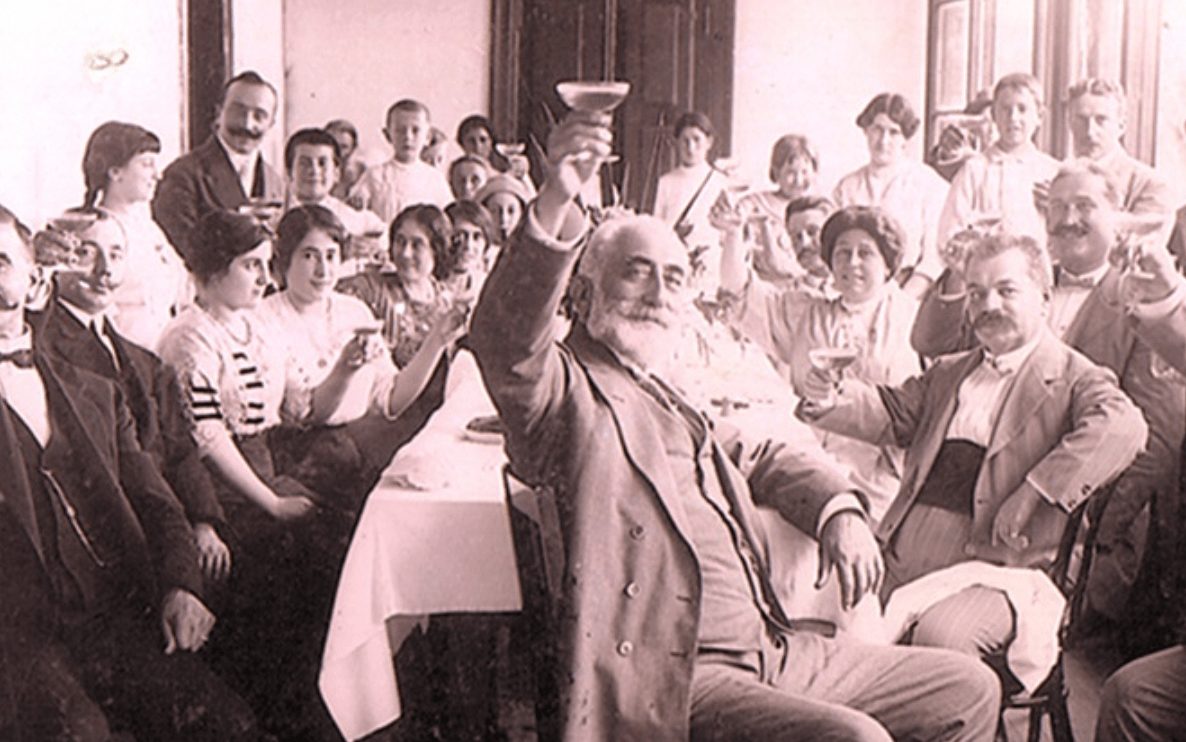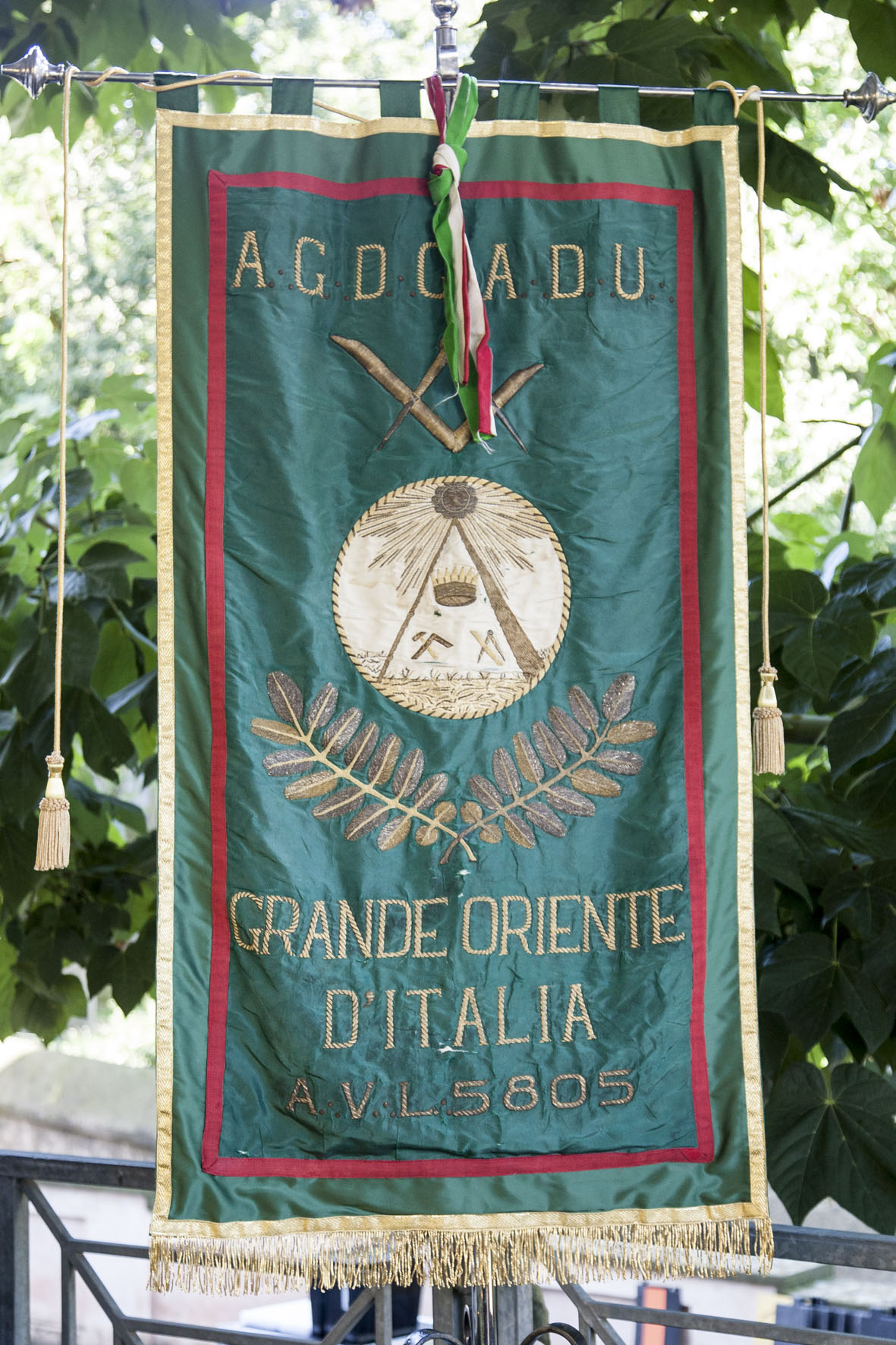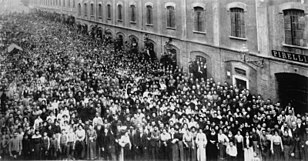We know almost all there is to know of the Italian Masonic historiography. We have done some progress concerning the study of Freemasonry presence and history in countries of the Mediterranean basin, but in Latin America the research is still in its inception. The purpose of this paper is to present a basic historical look at the relation between the Grand Orient of Italy (GOI), the most important Masonic Obedience in the Country, and the Italian lodges in Brazil.
The city of São Paulo has always had a large presence of Lodges run by foreigners, and in such a reality it felt natural for Italian-speaking settlers to gather and form their own first Lodge in early 1884. Shortly after that event , however, a disruptive and problematic issue came to light: the eagerness of those Freemasons to submit to the Grand Orient of Italy in Rome. Such intense yearning in the vast community of Italian immigrants , whether already Freemasons or aspiring men, imposed a dilemma upon the leadership of the GOI. A constant-rising of Lodges in South America controlled by the Grand Orient of Italy would have enhanced its reputation and influence in the world, but only at the cost of creating international tensions. In such a highly delicate context, the Grand Orient of Italy temporarily withdrew its design.
The Italian Freemasons’s unrelenting resolve to have their own Grand Lodge paid off in 1888 when the Grand Orient of Rio de Janeiro sent to São Paulo a commission to consecrate the Loja Italia. The ceremony was of extreme significance for the colony of Italians, and it turned out to be remarkably well attended by other local Lodges too. When in 1892, the Loja Roma of São Paulo organized a procession in reminiscence of the death of the philosopher Giordano Bruno, the delegates of other Lodges of the City, and the profane community, took part in big numbers. The presence at that ceremony of Cesare Roncaglia, a ‘brother’ from the Grand Orient of Italy in Rome, reveals how close was the relationship of the Italians residing in Brasil with their homeland and how important was for them to reassert such closeness to their Country of birth or descent. It was not coincidental that the Lodge’s banner had been made in Naples !
The ceremony was of extreme significance for the colony of Italians, and it turned out to be remarkably well attended by other local Lodges too. When in 1892, the Loja Roma of São Paulo organized a procession in reminiscence of the death of the philosopher Giordano Bruno, the delegates of other Lodges of the City, and the profane community, took part in big numbers. The presence at that ceremony of Cesare Roncaglia, a ‘brother’ from the Grand Orient of Italy in Rome, reveals how close was the relationship of the Italians residing in Brasil with their homeland and how important was for them to reassert such closeness to their Country of birth or descent. It was not coincidental that the Lodge’s banner had been made in Naples !
In the early months of 1894, seven Lodges in the district of São Paulo separated and formed the Grand Orient de São Paulo. Faced with the schism, the Italian Masonic leadership came off the fence and established a Grand Lodge under the Obedience of the GOI , Rome. It was named Giuseppe Petroni (in honour of the late Italian Grand Master) to emphasise its link with Italy. This violated international practices, but the Roman Grand Orient explained its action by pointing to the turbulent situation prevailing in Brazil at the time, that screamed for a “regular” Obedience to be present. Not all the Italian Freemasons in Brazil , however, turned out to care too much about being under the influence of the Grand Orient of Italy.  The Loja Cristoforo Colombo in São Carlos do Pinhal, for example, despite heeling the events of its Brethren’s distant homeland with thought and support, preferred not to submit. The Loja Italia of São Paulo was established in 1896 and, according to the Masonic magazine Rivista della
The Loja Cristoforo Colombo in São Carlos do Pinhal, for example, despite heeling the events of its Brethren’s distant homeland with thought and support, preferred not to submit. The Loja Italia of São Paulo was established in 1896 and, according to the Masonic magazine Rivista della
Massoneria Italiana, it comprised a significant amount of Freemasons animated by a “deep patriotic feeling” towards Italy. It was an obvious first signal that Italy planned of becoming a dominant influencer in Brasil. Two years after the creation of the Loja Italia, the Loja Giordano Bruno of São Paulo was also made “regular”. At the meeting that was held in May 1901,the Venerable Master of the Grand Loja Petroni reminded everyone attending that one of the main duties of the Masons under the Grand Orient of Italy was to fight the superstition and obscurantism of the Church.
 On September 20, 1901, a most remarkable ceremony was held to celebrate the Autumn Equinox and also a day that in 1870 marked the capture of Rome from the Pontiff State and its incorporation into the Kingdom of Italy. To attend the event there were deputies from the Grand Orient of Brazil and Brethren from many other foreign Lodges. To the festivities took part also some non Masons to whom Brother Pasquinelli explained Freemasonry worked in secret only because the people had not yet reached that degree of perfection necessary to free themselves from superstitions.
On September 20, 1901, a most remarkable ceremony was held to celebrate the Autumn Equinox and also a day that in 1870 marked the capture of Rome from the Pontiff State and its incorporation into the Kingdom of Italy. To attend the event there were deputies from the Grand Orient of Brazil and Brethren from many other foreign Lodges. To the festivities took part also some non Masons to whom Brother Pasquinelli explained Freemasonry worked in secret only because the people had not yet reached that degree of perfection necessary to free themselves from superstitions.
 In 1903 some Italian Freemasons met in Botucatù but given their limited number, they could not establish the Loja Silvano Lemmi until December of the same year. In the spring of 1904, in São Paulo, a new Lodge called Loja Menotti Garibaldi also opened. The exceptional skill of the Italians to fully integrate in the social and political fabric of the largest country in the South American continent, was reflected by a growing Italian presence in influential positions within the Grand Orient of Brazil. In 1911, in fact, there were in São Paulo the following strictly Italian speaking Lodges:
In 1903 some Italian Freemasons met in Botucatù but given their limited number, they could not establish the Loja Silvano Lemmi until December of the same year. In the spring of 1904, in São Paulo, a new Lodge called Loja Menotti Garibaldi also opened. The exceptional skill of the Italians to fully integrate in the social and political fabric of the largest country in the South American continent, was reflected by a growing Italian presence in influential positions within the Grand Orient of Brazil. In 1911, in fact, there were in São Paulo the following strictly Italian speaking Lodges:
Loja Antigua Rome
Loja Rome
Loja Giordano Bruno
Loja Guglielmo Marconi
Loja Deus et Patria (in Batataes).
And in the Province of Minas Gerais, there were:
Loja José Garibaldi
Loja Unione Italiana-Benso di Cavour
Loja Caridade Firmeza
The outbreak of the Great War seriously impacted on Freemasonry. The disagreements were not restricted to the European stage, but also reached the American continent, feeding the nationalistic spirit of the settlers there. The Grand Master of the Grand Orient de São Paulo, Antonio Frederico Zerrenner, was acutely perceptive to nationalistic calls and favoured a process of ‘Germanization’ of the Masonic Lodges, something that the Brethren of other linguistic minorities duly condemned and opposed. The Italian Grand Lodge was dissolved shortly before the Great War but anti-German sentiments contributed to the formation of many new Italian Lodges and compensated for the loss of the Petroni. They were:
Loja Andrea Costa
Loja Aquila Romana
Loja Nuova Italia
Not every Lodge, however, joined existing Grand Orients. One group, in fact, adopted to give life to an autonomous Grand Orient by recruiting, among others, the following Lodges:
Loja Roma
Loja 1° Maggio
Loja Giustizia
Loja Antica Roma
Loja Guglielmo Marconi
Loja Prudente De Moraes
Loja União Espanola
Loja Fratellanza Universale
Loja 14 de Juillet
Loja Cesare Battisti
As it easily transpires from those names, most of the Lodges operated in Italian. The new Grand Orient chose as its Grand Master, the professor and physician Arturo Guarnieri, who was an important personality in the Italian colony of São Paulo. His first deed was to issue a supremely political anti-German declaration that encouraged the Freemasons to reject “the Germans and their friends”.
With the end of the conflict, the news feeds from South America experienced a radical decline of interest in the Italian press. The political and social chaos that hit Italy in the post-war period, in fact, absorbed the attention of the Masonic world and in 1922, after the memorable ‘March to Rome’, a government led by Benito Mussolini was formed in Italy.
By Demetrio Xoccato (Centro di Ricerche Storiche sulla Libera-Muratoria)
- Influencia de la Masonería en Chile - April 29, 2024
- Pomegranate in Freemasonry – its significance - March 11, 2024
- Inns and Innkeepers’ incidence in Freemasonry expansion - February 28, 2024

